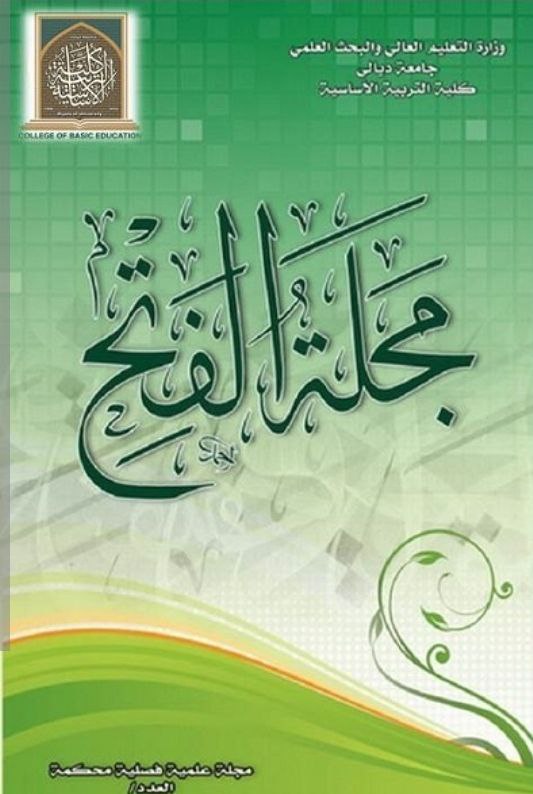Iraqi EFL Teachers' Perception of Classroom ehaviours at Secondary Schools
Abstract
Education plays a leadership role in all aspects of life.
By providing the quality education one can produce quality
products through adopting an effective academic behaviour
in educational process. “Behaviour” is defined as the action
or activities of an organism that is anything that an organism
does, including physical action, internal physiological and
emotional processes and implicit mental activity. The focus
on behaviour is important in the teaching process for no one
has complete control over his feelings or his personality .
For a teacher, s/he should have control over most of his / her
actions. So, those actions and decisions which generate them
contribute to successful teaching. Teaching can in fact, be
defined as conscious behaviour that makes learning more
probable and more efficient than it would have been without
that behaviour. Teaching behaviour can range from a simple
smile or pat that encourages the learner to a superbly
designed, programmed presentation of a complex process
that results in predictable, efficient and effective learning.
As for teacher behaviour and learner's behaviour, it is
obvious that a complex interaction occurs in teaching. The
decisions and actions of a teacher affect the learning
process. The teacher’s observation of the learner or previous
knowledge about him affects the teaching process (Shafqat
2009:xv). The present research, therefore, aims at:
1- assessing EFL Iraqi teachers' perception of classroom
behaviours at secondary schools,
References
Ahmad, M. (2001). To investigate the Causes of Dropout
at Higher Level.
(Unpublished M. Phil. Education thesis), AIOU,
Islamabad, Pakistan.
Allport G. W. (1960). Personality and Social
Encounter. Boston, U. S. A.
Beacon Press .
Bhatia, H. J. 1977. A Textbook of Educational Psychology.
New Delhi:
Macmille company of Ida.
Brophy J. (1989). Teacher Influence on Student
Achievement . American
Psychologist. United States of America: Houghton
Mifflin Company.
Conant J. B. (1993). The Education of America Teachers.
New York :Mc Graw
Hill.
Das R. S. (1993). Educational Technology. New Delhi:
Sterling Publisher.
Derk, R. (1974). Educational Technology in Curriculum
Development.
New York :Harper and Row Publication.
Govt. of the Punjab. (1998). The Critical Study of
Practice Teaching by Trainee Teachers in Pre-Service.
Directorate of Staff Development.
Lahore, Pakistan.
Gupta S. M. (1996). Teacher Education in the Changing
Scenario. India : Parkash Brothers, Ladhiana.
Harmer, Jeremy (2001) .The Practice of English Teaching.
England: Oxford University Press.
Hedges, W. D. (1966). Testing and Evaluation for Sciences.
Wordsworth, California.
Hayon, L. K. (1989). The International Encyclopedia of
Teacher Education. London: Paragon Press.
Iqbal, Z. (1996). Teacher's Training . Institute of policy
studies and international Institute of Islamic Thought.
Islamabad Pakistan.
Johnson America Lois V. & Bany Mary A. (1970).
Classroom Management, Theory and Skill Training. United
Sates of America: The Macmillan Company.
Joyce, B. (1980). Models of Teaching. Printice Hall Co.,
Englewood Cliffs.
Luthans, F. (1993). Organizational Behaviour. 6th Ed.
New York: McGraw- Hill. New
Maslow, A. H. (1979). A Theory of Human Motivation.
Psychological Review. New York :Harper and Row
Publisher.
Nunnaly, J. C. (1972). Educational Measurement and
Evaluation. 2
nd ed. New York : Mc Graw-Hill, Inc.
Ogwezi, B. C. and W. D. Wolomsky. (1985). Preparing
to Teaching. London: Pitman Publishing Ltd.
Rosenshine, B. and N. Furst. (1973). The use of Direct
Observation to Study Teaching. Chicago: Rand McNally.
Siniscalco , M. Teresa , and Auriat , N.
(2005).Questionnaire Design. France : Paris .International
Institute for Educational Planning/UNESCO.
Smith, P. D. (1977). Small Groups and Personal Change.
London, Methuen.
Sybouts, W. and F. C. Wendel. (1994). The Training and
Development of School Principals. New York : Green Wood
Press.
Taneja, R. P. (1989). Anmol’s Dictionary of Education.
India: Anmol Publications New-Delhi.
The American Heritage.(2000) Dictionary of the English
Language. rept. 2009. 4
th ed. .USA. Houghton Mifflin
Company.
UNESCO. (1975). Report of International Conference of
Education. Janeva:
UNESCO Press.
------------- (1986). Glossary of Educational Technology
Terms. Janeva:
UNESCO Press.
Downloads
Published
How to Cite
Issue
Section
License
Copyright (c) 2023 مجلة الفتح للبحوث النفسية والتربوية

This work is licensed under a Creative Commons Attribution 4.0 International License.
حقوق النشر والترخيص
تطبق مجلة الفتح للبحوث التربوية والنفسية ترخيص CC BY (ترخيص Creative Commons Attribution 4.0 International). يسمح هذا الترخيص للمؤلفين بالاحتفاظ بملكية حقوق الطبع والنشر لأوراقهم. لكن هذا الترخيص يسمح لأي مستخدم بتنزيل المقالة وطباعتها واستخراجها وإعادة استخدامها وأرشفتها وتوزيعها ، طالما تم منح الائتمان المناسب للمؤلفين ومصدر العمل. يضمن الترخيص أن المقالة ستكون متاحة على نطاق واسع بقدر الإمكان وأن المقالة يمكن تضمينها في أي أرشيف علمي.
لمزيد من المعلومات، يرجى متابعة الرابط: https://creativecommons.org/licenses/by/4.0/.



